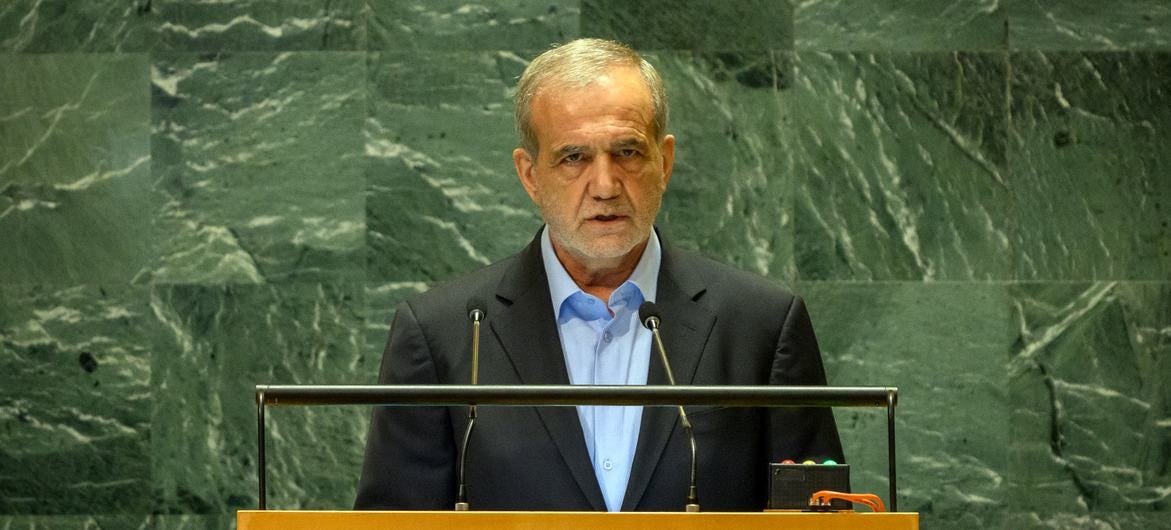Israeli's Crimes Against Humanity
Iran Demands Accountability for Israeli Murder of Palestinians and Lebanese at UNGA

Iranian President Masoud Pezeshkian addressed the ongoing 79th UN General Assembly (UNGA) in New York, raising concerns over the global silence on Israel’s continued genocide in Palestine and Lebanon. He proposed a regional initiative for peace and collective prosperity as an alternative to the West’s lack of action.
“It is imperative that the international community should immediately stop the violence and bring about a permanent ceasefire in Gaza and bring an end to the desperate barbarism of Israel in Lebanon, before it engulfs the region and the world,” Pezeshkian said.
He criticized the international community’s inaction on Israel’s genocide in Gaza, demanding accountability for the murder of over 41,000 Palestinians, primarily women and children, during the 11-month war. During UN discussions, Pezeshkian also condemned Israel’s labeling of global opposition to its actions as antisemitic and highlighted Israel’s blatant disregard for international law and human rights.
The Iranian president also pointed to Israel’s assassination of Iranian scientists and diplomats, and accused the occupation entity of supporting terrorist groups like ISIS. He also condemned the killing of Ismail Haniyeh, Hamas’ political head, in July this year while Haniyeh was an official guest in Iran.
Pezeshkian criticized the United States for repeatedly blocking UN resolutions aimed at halting Israeli attacks on Gaza and Lebanon, as well as preventing the implementation of guidance already passed by the UN Security Council. He said: “The responsibility for all consequences will be borne by those who have thwarted all global efforts to end this horrific catastrophe, and have the audacity to call themselves champions of human rights.”
Iran seeks non-interference and peace in the region
Pezeshkian emphasized that the key to regional security lies in ending Israel’s occupation and restoring Palestinians’ right to self-determination. “We are confident that through this mechanism we can achieve a lasting peace, with Muslims, Christians, and Jews living alongside one another in one land in tranquility and peace, and away from racism and apartheid,” he said.
He reaffirmed Iran’s support for the Palestinian liberation movement and commitment to opposing Israel’s crimes against humanity. Pezeshkian also reiterated Iran’s proposal for regional peace and stability, with greater cooperation among regional countries and less reliance on external forces.
For years, Iran has advocated for a regional security framework and the withdrawal of foreign troops, including US forces stationed at numerous military bases across the region. Some bases, like those in Syria, are built on occupied territories, while others exist due to bilateral agreements made under the pretext of security or because of US pressure.
Pezeshkian affirmed that countries in the region are capable of addressing issues such as war, terrorism, sectarianism, drug trafficking, and the refugee and environmental crises without external interference. He assured that Iran seeks peace and stability, not conflict: “The Islamic Republic of Iran seeks to safeguard its own security; not to create insecurity for others. We want peace for all and seek no war or quarrel with anyone.”
He reaffirmed Iran’s willingness to discuss the restoration of the Joint Comprehensive Plan of Action (JCPOA), which the US unilaterally withdrew in 2018 and then imposed unilateral sanctions on Iran. Pezeshkian argued that these policies have caused immense suffering for Iranians, and called on US citizens to question their government’s actions and demand justice.
“Unilateral sanctions target innocent people and seek to undermine the foundations of the Iranian economy,” the Iranian president said. “This measure is not only a blatant violation of human rights but also constitutes a crime against humanity.”



